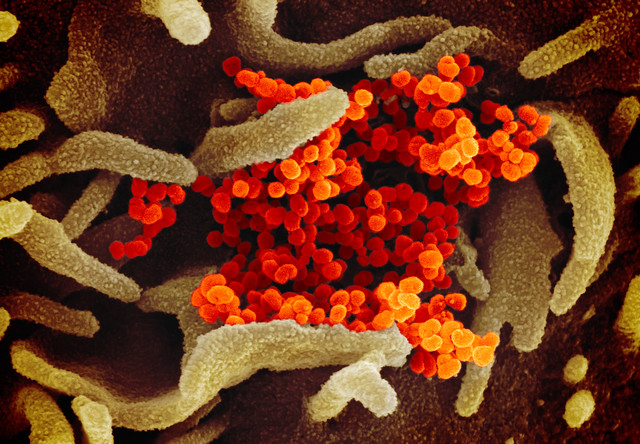The whole world is shaken by the spread of the new coronavirus. Presently, almost everyone has some basic ideas on this topic “COVID-19”, but the question is, how many of you are aware about the actual cause of this dreadful novel coronavirus? If you really want to be safe from this infectious disease then you are in the right place. Go through the entire blog post to know everything that you need to know about this COVID-19 virus.

What is Novel Coronavirus?
Coronaviruses are a huge family of viruses that can cause severe illness. It ranges from the common cold to rigorous diseases. This dreadful virus can be the main reason for Severe Acute Respiratory Syndrome (SARS) and Middle East Respiratory Syndrome (MERS).
In the month of December in 2019, a Novel Coronavirus known as SARS-CoV-2 was first detected in Wuhan, the capital of China’s Hubei Province. Later, the outbreak news of Coronavirus disease (COVID-19) was announced by the People’s Republic of China that has now been spread globally. This is known to be the 7th Coronavirus to affect mankind. Assessing the severity and spread of this outbreak, WHO has labeled COVID-19 as a pandemic.
Is Coronavirus Worse than Flu?
There is a huge discussion right now regarding this that is the Coronavirus worse than flu or not? Yes, based on the symptoms both COVID-19 and flu are very difficult to distinguish. The flu typically manifests itself in symptoms such as cough, fever, sore throat, headaches, etc. Just like the symptoms of Coronavirus.
But firstly and the most important difference between these 2 diseases is that the preventive vaccine and medication are available to treat flu. But right now we don’t have any proven medications or vaccines to fight back and eradicate this dreadful COVID-19. So, for now, it’s difficult to say this is worse. Researchers are still going on to discover a Coronavirus vaccine that may help treat or even prevent future occurrences.

How does Coronavirus Spread?
The Novel Coronavirus spreads from one person to another in close propinquity and respiratory illnesses alike flu. The droplets of corporal fluids such as mucus or saliva from an infected person spread by coughing and sneezing. Further, these droplets when coming in contact with other people can infect them or else can infect by touching the infected surfaces and then putting those hands into mouth or face.
What are the Symptoms of Coronavirus?
This virus is believed to be Zoonotic i.e., they are transmitted from animals to humans.
There are some common signs of infection that include respiratory symptoms. A list of some symptoms is given below:
- Cough.
- Fever.
- Pain in joints or muscles.
- Sore throat.
- Complexity in breathing.
- Loss of smelling sense.
- Sudden loss of taste sense.
- Other flu-like symptoms such as sneezing, running nose and weakness.
This infection can further cause pneumonia, SARS, kidney failure and even death.

Incubation era of Coronavirus
The symptoms of Coronavirus take at least 2 to 14 days to develop. Without proper medical diagnostic tests, it is hardly possible to discriminate whether someone is infected with Coronavirus (COVID-19) or some other infectious disease. It is because the virus is completely a new-fangled strain. If sources are to be believed then it is said that there is no immunity alive in any human being it will bump into.
It is believed that some level of immunity develops over time. This means that a person with concession immune systems – sick or elderly are most at the risk point of becoming ill or even die from this dreadful Coronavirus.
How to Prepare for Coronavirus: Safety Precautions
Following are few measures one should keep in mind to stay safe and away from Coronavirus disease :
1. Don’t Pay Attention to Fake News
The Coronavirus disease has taken the whole world by an alarm. The whole internet is filled with information about this virus and its spread. Some of the sources also provide wrong information. So it’s better to not follow the wrong path that will only cause panic among the people. It is wise to not believe in any information until it comes from a reliable source.
2. Avoid Touching Your Nose, Mouth, and Face
Medical advisors from World Health Organisation (WHO) have repeatedly advised everyone not to touch our face, nose, and mouth unnecessarily. This further does not spread from your hands to the nose or mouth. Keeping your hands clean will help reduce the chances of the infection.
3. Wash Hands Frequently
One of the most important habits that you need to follow during this phase is to wash your hands properly with warm water and soap. This helps in removing oils from your hands that can port microbes. You can also opt for hand sanitizers that contain at least 60% alcohol when soap and warm water is not available. This also protects you against disease-causing microbes.
4. Do Activities to Boost Your Immune System
In this global pandemic era, it is really necessary to do whatever you can do to keep your body as healthy as possible. Improve your hygiene, hydrating, staying active and eating well. Among all this, it is important to have a good quality of 7-8 hours of sleep per day to stay healthy. Rather than this, expose your body to the sunlight to produce a good amount of Vitamin D in your body.
Avoid fast food and try to keep on homemade food rich in vitamins like egg yolks, whole grains, green leafy vegetables, nuts, etc. If researchers are to be believed then the immune system is responsible for fighting against Coronavirus.
5. Don’t Travel Unless Compulsory
Public transports are the most likely place where you could get affected by this virus. It is advisable not to travel unless it is really necessary. In case you are traveling, you should take the required precautions before moving out like carrying a mask and alcohol-based hand sanitizer. Also, maintain a distance of at least 2 meters from other people while you are traveling.
6. Try to Maintain Social Distance
Most crowded places like the gym, shopping malls, social gatherings or other crowded place needs to be avoided at this time. The more the number of people, the more is the risk of the spread of the virus. “Social distancing” and not coming in contact with a lot of people is an effective way to stop the spread of the disease.
7. Practice Respiratory Hygiene
It’s important to follow good respiratory hygiene. Everyone should be covering their nose and mouth with a flexed elbow or try to use a tissue paper when you sneeze or cough. Dispose of the tissue immediately after use. This is a good practice as we know that droplets spread the virus. Maintaining good respiratory hygiene will protect you and the people around you from viruses.
8. Work from Home
It is better to work from home in this critical situation that the whole world is facing. Some of you may be in confusion about why it is needed to stay and work from home. For say someone got infected and he or she won’t know until 14 days. He or she goes without knowing and is infecting 3 persons per day and those 3 persons going out and infect 9 more people and the chain goes on like this. So it’s really important to stay at home as we don’t know who is okay and who is infected. So be responsible and stay at home as much as possible.
9. Seek Medical Care if You Feel Unwell
It is better to stay back at home. In case if you feel unwell i.e., fever, cough, difficulty in breathing et cetera, immediately seek medical help or inform local health authorities. As national and local authorities will have the up to date information in this situation. Follow the directions that are provided by them. This will further help prevent the spread of viruses.
So to conclude in short, it’s really important to be calm and not to pay attention to any wrong circulated the news. Most of the time it seems that panic leads to the wrong decisions. So at this crucial period, it is important to make correct decisions that will be beneficial for you, your family, friends, and neighbors. For that, we just need to follow some basic personal hygiene with some simple precautions.

Reliable Sources for Coronavirus Information
Below given is a list of websites that you can trust to get more updated information about Novel Coronavirus (COVID 19) disease.
| Coronavirus Websites | Region |
|---|---|
| COVID-19 Official Website | United States |
| COVID-19 Information NIH | United States |
| WHO Coronavirus Updates | Worldwide |
| CDC Coronavirus Website | United States |
| UK Government Coronavirus Update | United Kingdom |
| Coronavirus (COVID-19) Health Alert Australia | Australia |
| Coronavirus Information Canada | Canada |
| Coronavirus Official Website India | India |
| Bing Coronavirus Tracker | Worldwide |
| Google Website for Coronavirus | Worldwide |
| COVID-19 NJ Information Website | New Jersey, US |
| COVID-19 Website NZ | New Zealand |
| COVID-19 California Website | California, US |
| DOH Website Coronavirus Update | Philippines |
| Johns Hopkins Coronavirus Website | Worldwide |
| Live Coronavirus Map | Worldwide |
Be up to date with information from the above-mentioned sources and most importantly, make sure to contact reliable medical practitioners if you feel sick. Just go and visit the doctor at once if you start to see the symptoms that may indicate the sign of the infection of this dreadful Novel Coronavirus (COVID-19) disease. Be safe, don’t panic, and follow all the precautions mentioned above to be safe and secure.
 Heal City Health, Fitness and Lifestyle Online Magazine
Heal City Health, Fitness and Lifestyle Online Magazine

Great post thanks for sharing this.